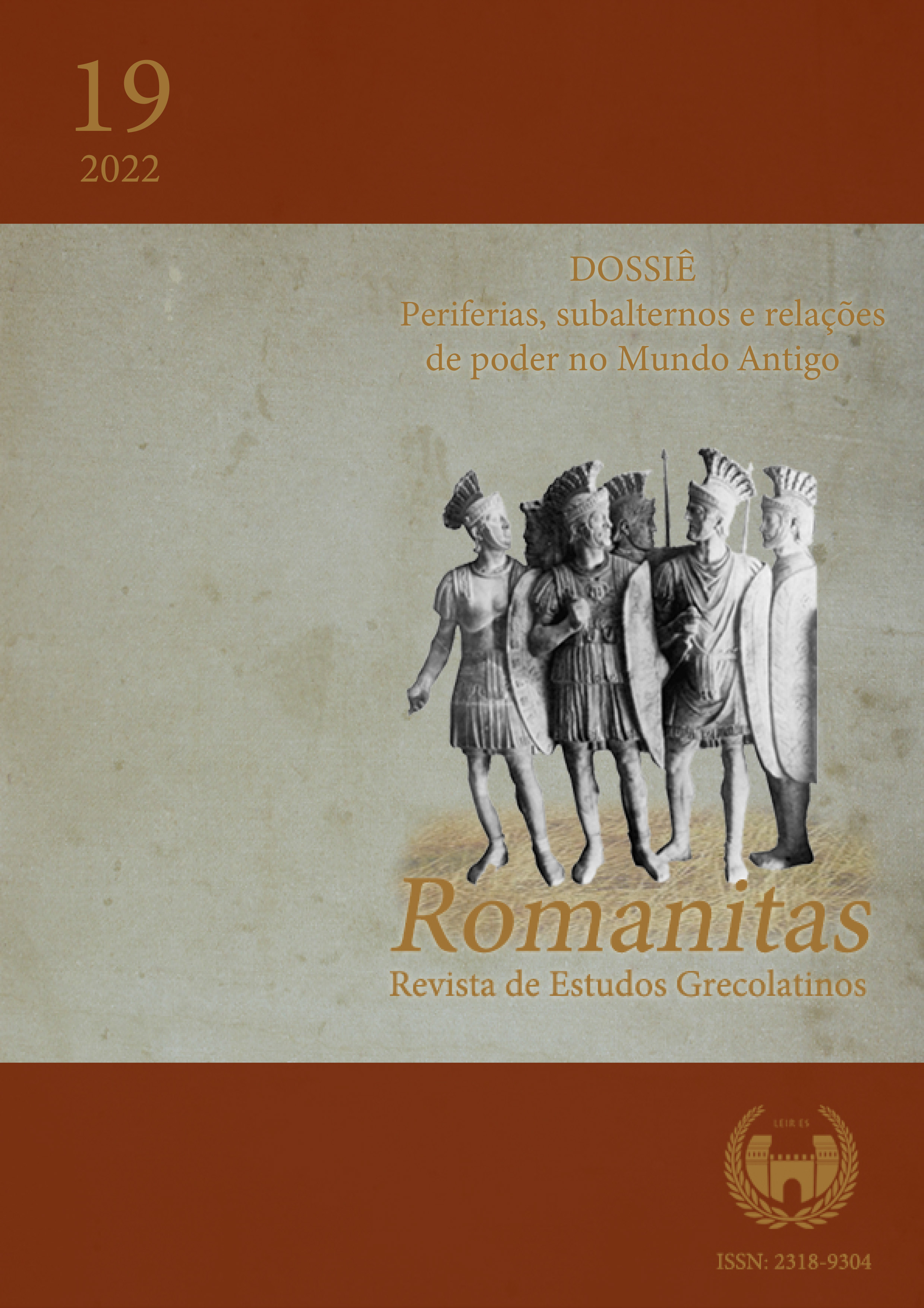Castigat ridendo moris’? Persius’ view from his satires to the entire Roman Principate in the first century of the Christian era
DOI:
https://doi.org/10.29327/2345891.19.19-8Keywords:
Persio, Satire, Roman EmpireAbstract
One of the biggest, if not the main objective of a satire was to attack the evils of a society from this literary tool. A didactic-moralizing element, the satirical genre would have arisen, or would be motivated, from the observations of the vices, whether moral and/or social, or even better, from the criticism of behaviors considered distorted, deviant from what is considered as an ideal standard of conduct. Its main purpose: what it endorses, as well as what it criticizes of the Roman society of the first century of the Christian era, aiming to standardize a behavior for the citizen inhabitant of Rome, in the same way as for all the inhabitants of the Empire. Here, we make use of the verses written by a distinguished author who lived in the first century of the Christian era: it is Aulus Persius Flaccus, known only as Persius.
Downloads
References
Documentação textual
PERSIO. Sátiras. Introducciones generales de Manuel Balasch. Introducciones particulares, traducción y notas de Manuel Balasch. Madrid: Gredos, 1991.
PERSIO. Sátiras. Introdução, tradução e notas de Fábio Cairolli. São Paulo: Assimetria, 2019.
Obras de referência
ANDERSON, W. Essays on Roman satire. Princeton: Princeton University, 1982.
ARMANI, C. H. Reflexões sobre o contexto na História Intelectual: entre a virada linguística e o novo Materialismo filosófico. Tempos Históricos, v. 19, n. 1, p. 80-102, 2015.
BRUNO, H. Pérsio: introdução, tradução e notas. 1980. (Dissertação em Latim) – Programa de Pós-Graduação em Letras Clássicas da Universidade de São Paulo, São Paulo, 1980.
BUSTAMANTE, R. M. C. Práticas culturais no Império Romano: entre a unidade e a diversidade. In: SILVA, G. V.; MENDES, N. M. (org). Repensando o Império Romano. Rio de Janeiro: Mauad, 2006, p. 112-135.
CASTRO, M. B.; LEITE, L. R. Releitura da tradição nas sátiras de Pérsio. Itinerários, n. 45, p. 235-254, 2017a.
CASTRO, M. B.; LEITE, L. R. O prólogo de Pérsio como profissão de fé. Litterata., v. 7, n. 2, p. 135-146, 2017b.
CASTRO, M. B. O Programa satírico de Pérsio frente à tradição. 2015. (Dissertação em Letras) – Programa de Pós-Graduação em Letras da Universidade Federal do Espírito Santo, Vitória, 2015.
CIZEK, E. Néron. Paris: Fayard, 1982.
D’ONOFRIO, S. Os motivos da sátira latina. Marília: Alfa, 1968.
FAVERSANI, F.; JOLY, F. D. Tácito, sua Vida de Agrícola, e a competição aristocrática no Alto Império Romano. Mnemosine, v. 4, n. 1, p. 133-147, 2013.
HANSEN, J. A. Anatomia da Sátira. In: VIEIRA, B.; THAMOS, M. (Org). Permanência Clássica: visões contemporâneas da Antiguidade greco-romana. São Paulo: Escrituras, 2011, p. 145-170.
JOLY, F. D. Libertate opus est: escravidão, manumissão e cidadania à época de Nero. Curitiba: Progressiva, 2010.
LOPES, M. A. História Intelectual: variações de gênero e convivência de paradigmas. História Unisinos. v. 19, n. 1, p. 23-30, 2015.
LORIGA, S. O pequeno X: da biografia à história. Belo Horizonte: Autêntica, 2011.
OLIVEIRA, R. A. de. Alguns aspectos da Sátira VI de Juvenal. Caderno de Letras, v. 21, p. 31-42, 2013.
PARATORE, E. História da Literatura Latina. Lisboa: Fundação Calouste Gulbenkian, 1983.
PEREIRA, M. H. da R. Antologia da cultura latina. Coimbra: Instituto de Estudos Clássicos, 1986.
PARRA, A. G. Algumas manifestações religiosas orientais em Roma no Principado: Petrônio e Marcial. In: SILVA, Z. L. da; ANHEZINI, K. (org.). A escrita histórica e suas múltiplas faces. Assis: FCL Assis Unesp, 2011, p. 21-41.
PARRA, A. G. Sobre a descrença religiosa: uma análise das sátiras de Juvenal. In: MENARIM, C. A.; BERTAZI, M. H. (org.). Anais da XXXI Semana de História: palavra e destino comum. Assis: Unesp, 2015, p. 488-496.
PARRA, A. G. Os elementos religiosos nas ‘Sátiras’ do poeta Juvenal (séculos I e II d.C).
Tese (Doutorado em História) – Programa de Pós-Graduação em História da Unesp, Assis, 2016.
SCARPI, P. Politeísmos: as religiões do mundo Antigo. São Paulo: Hedra, 2004.
SCHEID, J. An introduction to Roman religion. Edinburgh: Indiana University Press, 2003.
SILVA, G. V. A representação da mulher na sátira romana: amor e adultério em Horácio e Juvenal. Dimensões, n. 4, p. 73-85, 1995.
SKINNER, Q. As fundações do pensamento político moderno. São Paulo: Cia das Letras, 1999.
Downloads
Published
How to Cite
Issue
Section
License

This work is licensed under a Creative Commons Attribution-NonCommercial-NoDerivatives 4.0 International License.
a. The authors retain copyright and grant the journal the right to first publication.
b. The authors are authorized to assume additional contracts separately, for non-exclusive distribution of the version of the work published in this journal (e.g., publishing in institutional repository or as a book chapter), with acknowledgment of authorship and initial publication in this journal.
c. Authors are allowed and encouraged to publish and distribute their work online (e.g. in institutional repositories or on their personal page) after the first publication by the journal, with due credit.
d. The journal's texts are licensed under a CC BY 4.0 Deed Attribution 4.0 International Licence (CC BY).




























